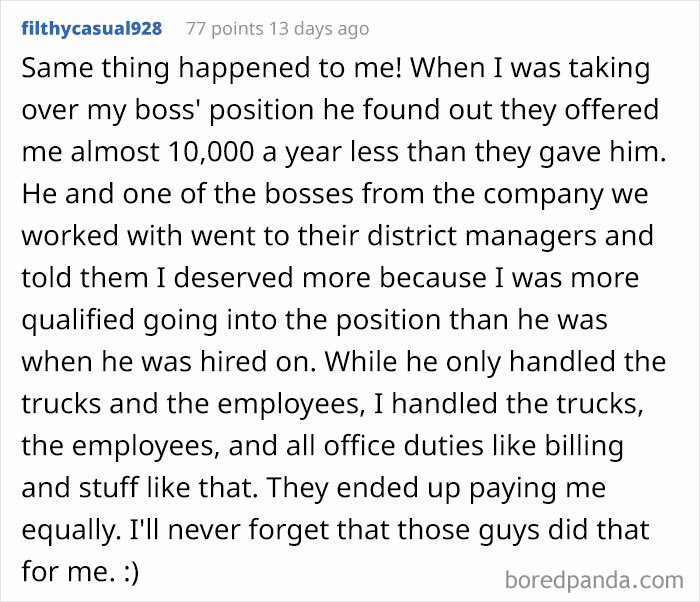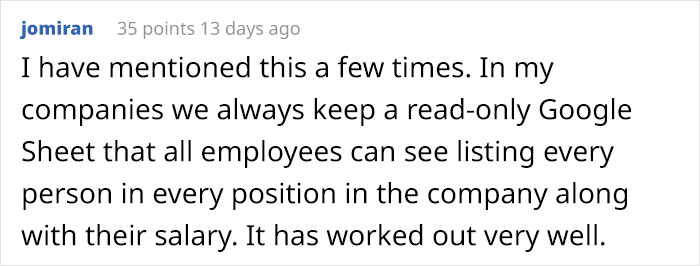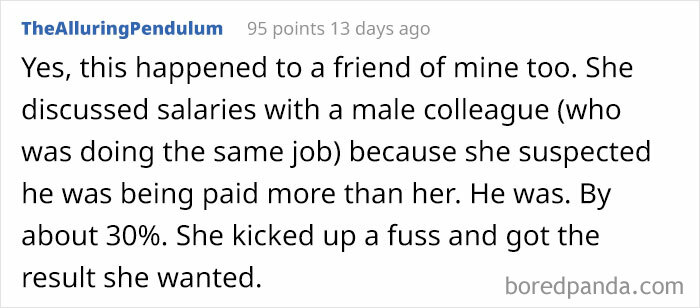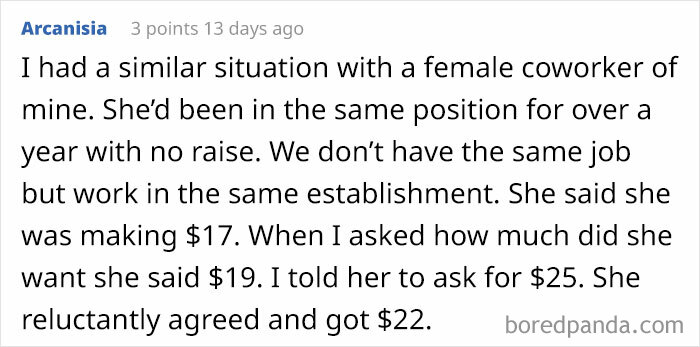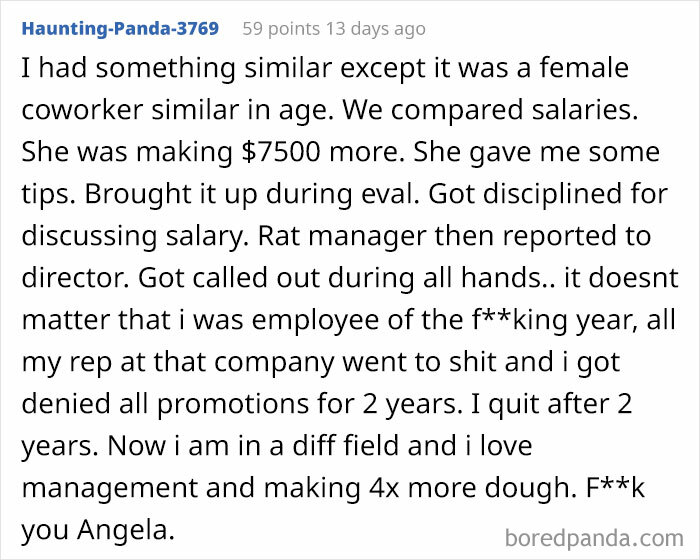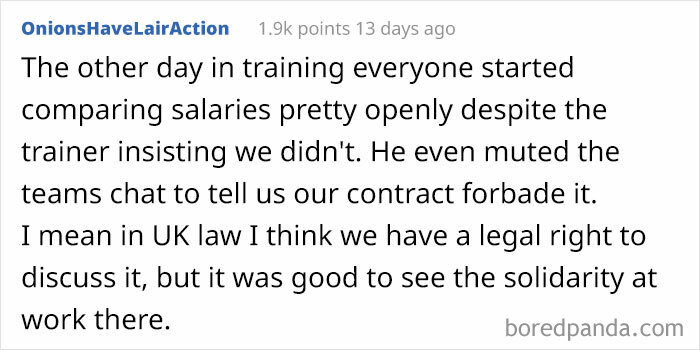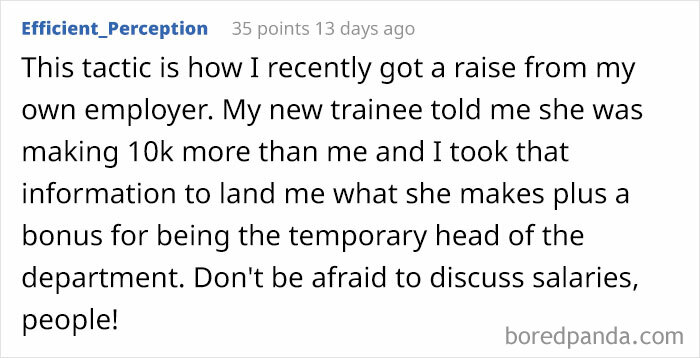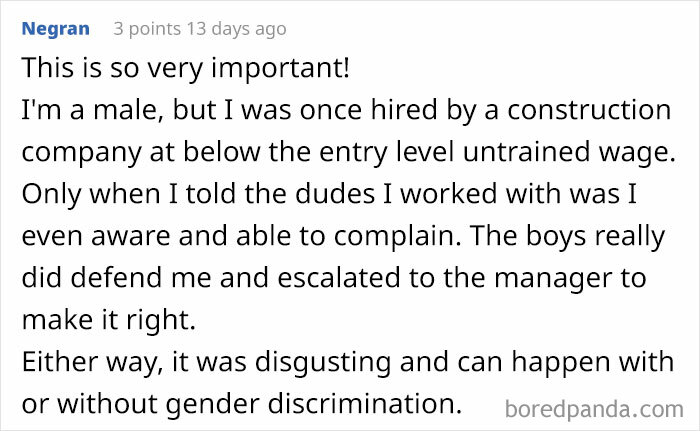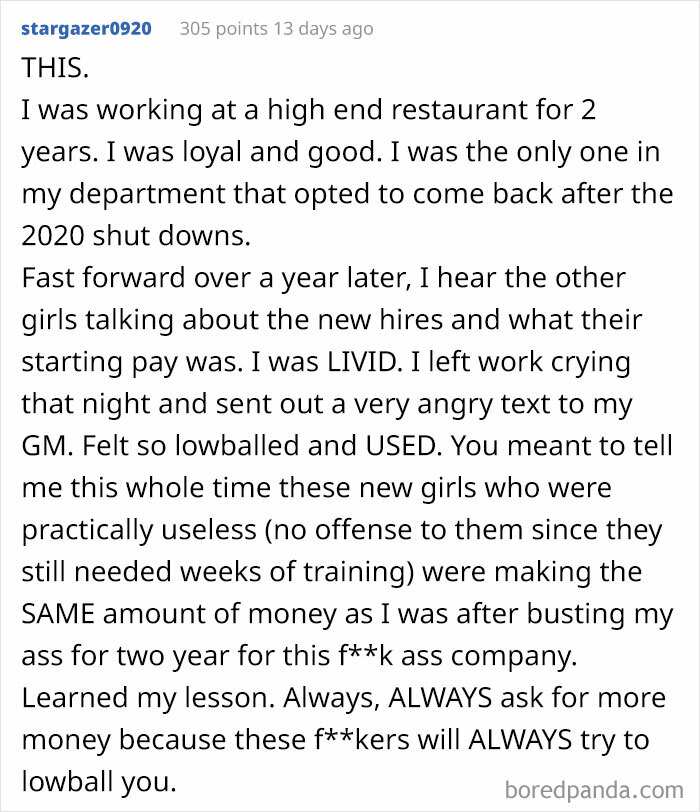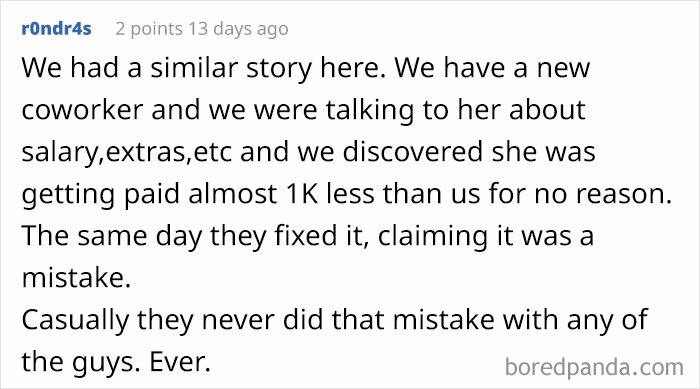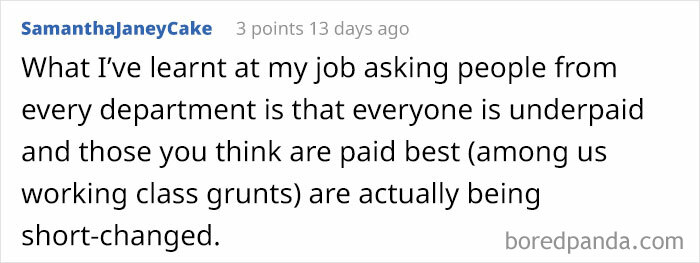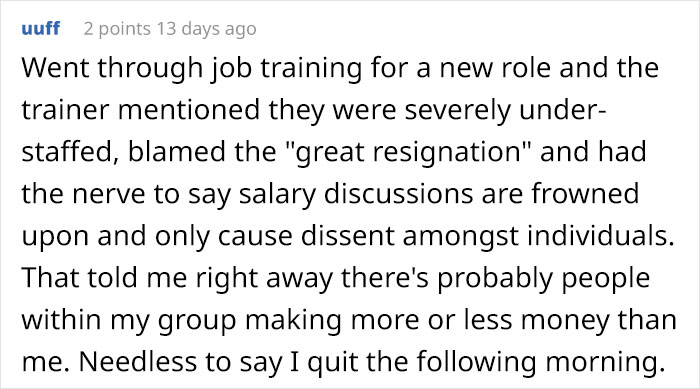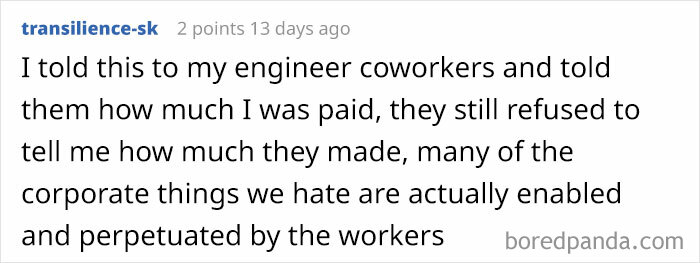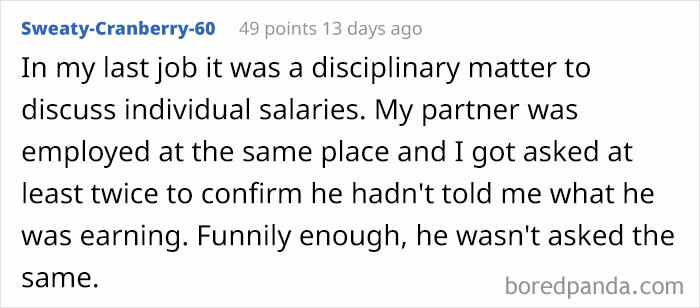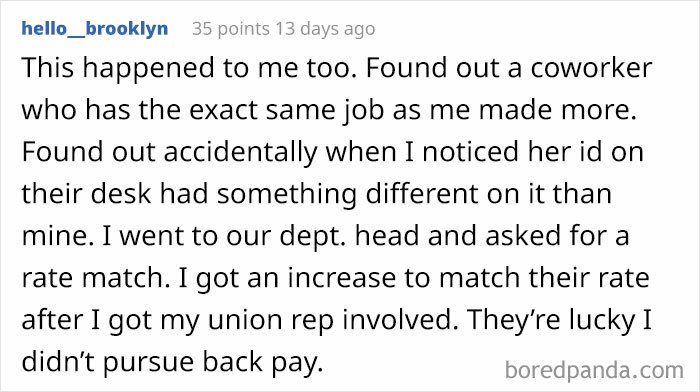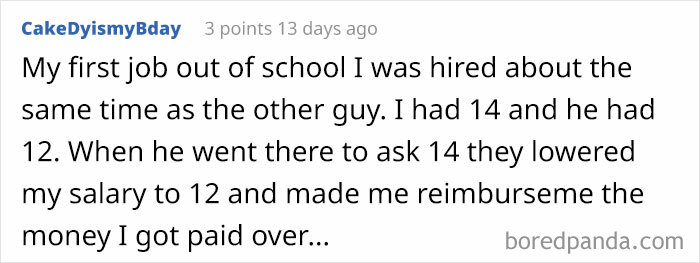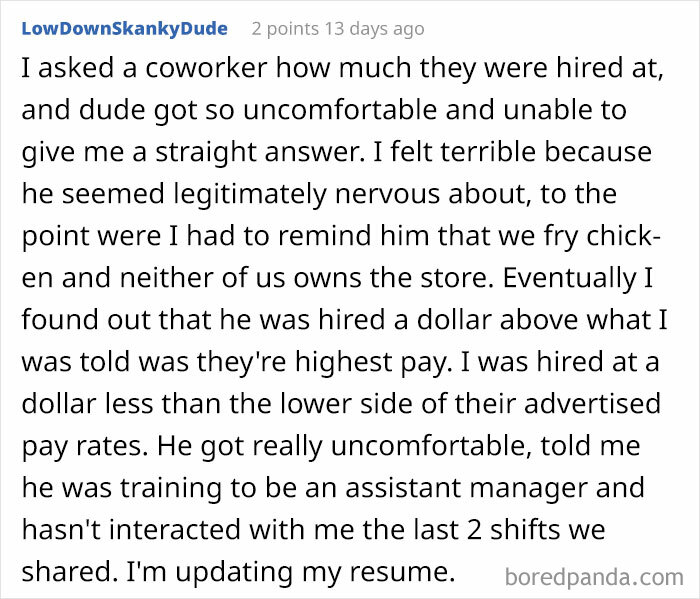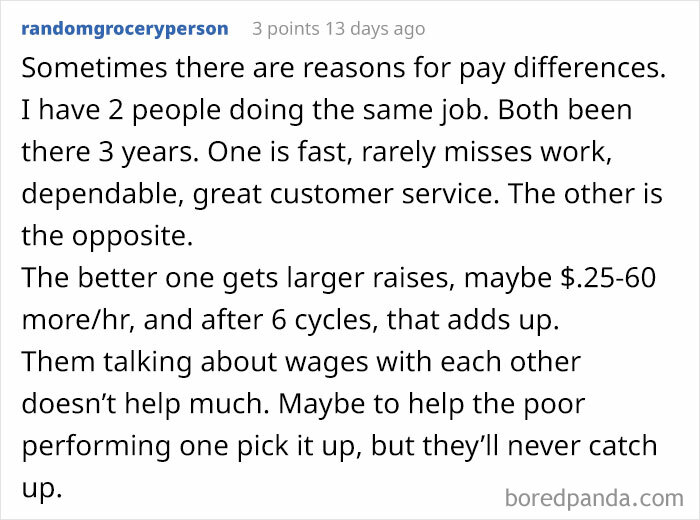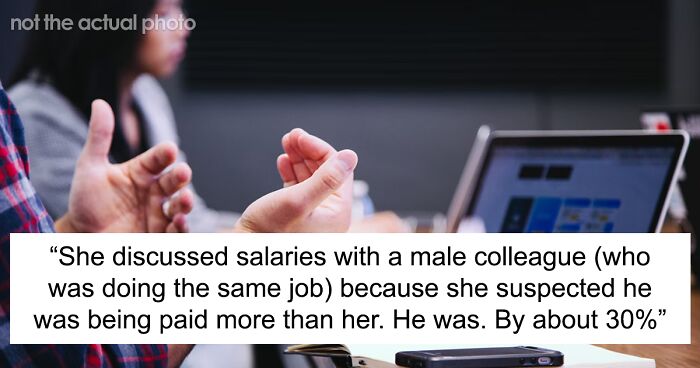
25 People Share How They Found Out They Were Significantly Underpaid And What They Did About It
InterviewFor as long as there have been jobs with men at the top, there has also been gender bias. Although things have improved (a bit), women in the UK and US are still getting paid around 15% less than their male counterparts. Either intentionally or by the command of some patriarchal, universal conspiracy — you see, almost half (46% to be precise) of men in the US believe that the pay gap in gender is as real as Looney Tunes — women workers are not getting their fair share of the pie. But how could they know if there's a social stigma attached to the age-old, uncomfortable question: how much do you earn?
Luckily, some men know better than to keep their hands tied. As the title story shows, after being shown just how much she's being underpaid for the same responsibilities as her male counterpart, the same colleague who spilled the beans helped to set things right. And while there are many similar stories like this one, the reality is — pay disparity stems from the wider culture within, not individual companies.
After an accidental run-in with her male counterpart at work, a woman learned just how terribly the gender pay gap affects her salary
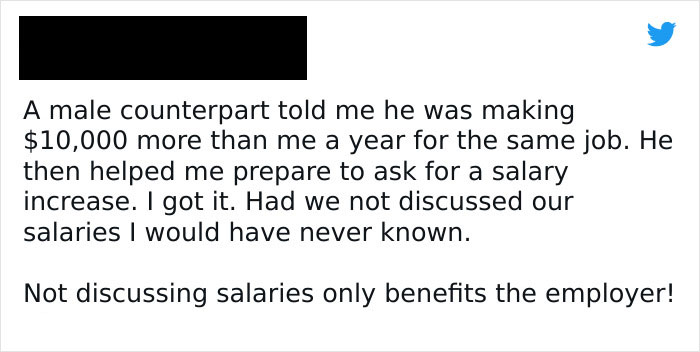
Encouraged by this story, women started sharing their own discriminatory experiences and tips on how to fight it
This post may include affiliate links.
This was kind, but why do we have to have men fight our fights for us? Why do we not get what we deserve, simply because we deserve it? I appreciate that what this guy did was nice, but how I resent having to have someone "take care of me".
Salary is a delicate subject. We all know how uncomfortable the atmosphere can get when asked about your pay expectations during a job interview. Likewise, the same goes for talking about compensation with your colleagues — something that still carries a scent of social taboo with it.
In a semi-recent survey done by Bankrate, it was found that less than 25% of people have shared (or were willing to share) how much they make with their coworkers. Which, to be honest, isn't so surprising considering that many companies are motivated to promote pay secrecy — either covertly or overtly — because it often saves them money.
The good news is: this is slowly changing with Millenials (and younger generations), as they are slowly pushing the envelope. Turns out, they're nearly twice as likely to discuss money with their colleagues compared to former generations.
I actually don't like this. I don't want people seeing how much I make. I wouldn't mind if they posted a salary range per position but no one has the right to know what I make unless I want them to. Especially because I bust my ass and SHOULD be paid more for that. I'm not going to get jealous people all pissed at me or purposely leaving work at my desk because they don't like that I make more than them. I also have no right to know why someone else is making less than me. Maybe they had disciplinary issues-- that's between the employer and employee and is none of my business. I feel like this is a huge violation of privacy and encourages jealousy and resentment. I get the sentiment here, to make everything more transparent so corruption doesn't happen, but putting "Position A = 35K-45K, Position B = 45K-55K" etc is more than sufficient. I work at a bank and we have grades so it's pretty clear.
One of the simplifications of the gender pay gap issue is that men and women tend to choose different career paths. So much, in fact, that researchers created a term for it: "gender occupational segregation." And while this theory is not completely wrong, researchers and economists started breaking down all of the components needed to see what may be the real cause of the gender pay gap.
You could say that things have improved: in 2016, an American woman earned 79 cents for every dollar a typical American man made. Today, this pay gap has narrowed as women are only 7 cents away from earning the same as their male counterparts.
Even after factoring in differences in education, experience, age, location, job title, industry and even company, there was still a 5-cent difference, which meant something was definitely off. Perhaps, this is the mysterious reason why almost 50% of men and 30% of women believe the problem of equal pay and gender parity has been "made up to serve a political purpose."
Waiting for all the men to come and explain that women don't actually get paid less for the same job. There is always a couple on threads like this.
While half the workers in the United States are subject to a phenomenon called 'pay secrecy' — especially those in private-sectors, where 66% of the employees were either formally prohibited from sharing their salaries or verbally discouraged from doing so, according to this study — it was found that women, and not men, are more likely to violate these policies.
Still, it's almost always easier to blame the silenced individuals instead of multi-billion dollar corporations and government bodies that (unsurprisingly) haven't been able to figure this out since the 60s when the first Equal Pay Act was introduced in America.
According to Laurel Smith-Doerr and Sharla Alegria, professors of sociology who recently published their research on the organizational-level gendered pay gap and agreed to share their findings with us — it has nothing to do with individuals. Except those who are at the top, running the faulty organizations.
"Certainly, employers choosing not to be open about compensation contributes to an enduring lack of pay equity," Doerr told Bored Panda. "[But] I wouldn’t pin the pay gap on individual employees." Indeed. Laurel and Sharla knew that on the ground level, our regular coffee chains and individual companies, things aren't yet adjusted to close the gap. But what they didn't suspect is that the same problem is as prominent on a federal level, as it is elsewhere. "We didn’t expect to see [that] some federal agencies choose more often to pay men, rather than women off of the general schedule pay grades, and pay those off-grade men higher average salaries," they explained in their findings.
The gender pay gap is in the crosshairs of many different studies in many different languages. But few are so determined to find out where the problem's roots are, as is Laurel's and Sharla's research. "The federal government is this kind of ideal case where pay is highly regulated in exactly the ways we account for when we look at something like the gender pay gap," Alegria said.
Different than most jobs, federal pay grades are based on education, experience, specific job tasks – things that when matched correctly should result in equal pay. Shouldn't matter if you're a congressman or a congresswoman. "Given how carefully regimented and tied to meritocratic ideals pay is in the federal government, we shouldn’t find systematic pay gaps around gender," continued Alegria. But, as Laurel quickly remarked, "it was surprising that we did find gender pay gaps."
"When we started, we expected the whole federal government to use the same pay grade scale to set pay. We learned that this is not the case at all," Alegria pointed out. They explained that pay grades varied exclusively for scientists and other professionals "whose pay in the private sector would be quite high." Thus, these alternative payment systems allow some to reach early retirement faster than those on the standard "general schedule," as they grant higher pay.
"Some agencies pay virtually all employees on the general schedule and these agencies had vanishingly small pay gaps when we accounted for pay grade. Other agencies used alternative pay grades extensively. In these cases, they tended to pay a larger share of men than women on an alternative scale, and consequently – we saw bigger pay gaps associated with pay grade," Doerr explained.
I don't think it's necessarily a bunch of evil managers with bad intentions telling people they shouldn't talk about salaries to save themselves. I think it's to avoid people from mistreating fellow employees. All these posts are very naive talking about how everyone bands together and 'Kumbaya'...but there are plenty of people I work with who do s**t work, are childish and would absolutely have an attitude of, 'she makes more money, let her do it.' Even if I make more for genuine reasons. If I got a raise because I worked longer hours, put in the time, busted my butt when other people handed off their problems to me, and I handled everything correctly, while Jane Q over there did the bare minimum and pushed anything she could off on someone else, she doesn't get to mistreat me because she now knows I make more than her in the same position. That's a disciplinary and production issue between her and our boss and it isn't my business or my fault.
This drives me nuts because every year here in the states, in my state of MA anyway, they do a minimum wage increase. At my old job, it took me almost 10 years to make 12 dollars an hour. (I started making 7.25 and got a quarter or 50c ever year, which is pretty standard for that work. I worked at a fast food place and became a manager and worked there through college). And then 4 years in a row they did $1 min wage increases. So someone starting right off the street was making 10 or 11 dollars but they didn't do any increases to our salaries if we weren't already making min wage. I work a good job now and make a decent amount but it happened again- our minimum wage went up 3 dollars (!!!) and people just starting off the street are only making about 2 dollars less than me. This is a case where I think people should absolutely discuss salaries openly, if for no other reason to bridge the gap between this disparity. When mim wage goes up so should everyone's pay.
When asked what a worker should do if there's a nagging feeling they're being shortchanged, Laurel and Sharla say there are quite a few ways to approach the problem. "If asking directly about your own pay doesn't feel quite right," Alegria said, "ask if your company has a process for regularly reviewing pay for gender equity and making adjustments."
Or, as Laurel recommends, it's worth "checking out the resources that are available on pay for comparable jobs at your employer." Glass Door, Indeed and PayScale are a few among many that provide this service. After all, with the COVID-19 recession finally coming to an end, Laurel believes "it might be a good time to make a move."
Same thing when I was in the Military. The Base Pay rate (and location-based Basic Allowance for Housing, Subsistence (food), etc) are all available online. Everyone can look up your salary/benefits, and you can look up theirs. It also helps when you are up for reassignment to a new location - you can research how much you will receive for BAH, COLA, etc there.
Absolutely true, because it's their job to give you as little pay as they can get away with (all about that almighty budget). Conversely, it's your job to try and get as much pay as you can get away with. So, yes, ALWAYS ask for more money. If they terminate you (or refuse to hire you if you are still interviewing with them), then it's not a company you want to be working at anyway.
I agree. Sometimes the managers are making less than you probably think. Everyone at my company used to think our managers made big bucks. This was a major company. I used to be a manager at and it was a backbreaking horrible job and I often took home less money than my employees because I was on salary. They got overtime and hourly. The amount of hours I had to put in broken down ended up being less than minimum wage. Don't always group your immediate bosses in the same category as the bigwigs--- the CEOs and CFOs and the people sitting in offices on the tops floors-- those are the people really screwing everyone over. Also small business owners-- sometimes those people are literally taking money out of their own pockets to pay employees because they don't want to lay people off or had a bad month. Restaurant owners in particular are often struggling and it may not seem like it.
If they don't react they make more than you. Only when they blow their top you make more than them. Just watch their faces when you tell them.
That argument would hold for a joining bonus... but anyway if signing up a new (untrained & un-found & untested one) is worth 50% more than your salary, then retaining you is clearly worth at least that if not much more. "Un-found" with all companies wailing how hard it is to find staff.
I think this is the exception that may prove the rule. Better, more loyal employees, of longer standing SHOULD get me higher rate, better bonuses. But it can be a real soul hit, when you find out that the place you have literally shoveled feces for, because the toilet broke, and who you consider the owner your friend, pays a newbie what your current hourly rate is. The kicker, I was standing right there when it was offered. I looked. At my employer at the time and said, "Really?, You think that's a good number to start? Why don't you tell her what she can expect after a couple of years?" I left. I was so unhappy I crashed for two days. I answered all my calls and yes she called and I went back and I received a substantial raise. But it was just such a bite I never felt the same or had the same loyalty. I was a much younger woman, and I've matured a lot, but I still feel that your employee base IS your business. You can get more customers ,but good employees are worth a good pay!
In my past company all females made 3-4 TIME LESS salary compared to guys... FOR EXACTLY SAME POSITIONS. They were told lies like "you have no experience", "no one else will want you at this level, so we are making you a favor". When all the employees were exact same level and ladies were super skilled, some of then way more then men. Disgusting. Ladies never said even a word. Hope they have a great life now and that company is long behind.
I used to do pay reviews every year and I was given a strict budget that could be split between my team in whichever way suited best. Now let’s say employee 1 would be in work, on time, ready to work and with all the kit he needed ( all the appropriate PPE as we worked with sewage), he worked pro-actively, kept me informed if issues arose and fixed things before they impacted upon our project. Employee 2 would be late every day, ill-equipped, constantly had to be reminded of his duties and his job description, he rarely spotted issues and was a reactive member of staff (if I was lucky enough for him to notice something wrong). Come pay review time employee 1 would get a better pay deal, employee 2 would get a small pay deal. When they inevitably talked about salaries employee 2 would be outraged, storm into the office, demand parity, we’d go through the reasons he didn’t command a higher wage, he’d promise to up his game, fail after a week….. rinse and repeat.
Exactly. As a manager, I see the exact samething from my employees. Unfortunately, society has convinced some women that it's gender related, when in fact it's strictly based on performance and skill. If you work for me and you're a woman who's paid less, maybe you should be reviewing your performance and skills. Just like everyone else.
Load More Replies...Paying someone less because of their sex is hopefully something which will be eradicated, however the issue of pay is not as simple as "2 people with same role, should get the same pay". I worked in a number of offices, where there would be a group of us starting at the same time, and usually on the same pay (it would always come up). With these roles there was usually yearly performance reviews and wage increases. A lot people came in, did the job that was in the job description, went home. I was very keep to upskill, so any time they asked for volunteers to help another department, or asked if I could do some additional work, I was happy to help. The people who just did their job got an increase, I got a higher increase because I was helping out beyond my role. One of the women I worked with was the same, which gradually resulted in a pay gap opening between us and others in the same role. Maybe oversight panels for pay reviews and more accountability for decisions could be an answer
In my past company all females made 3-4 TIME LESS salary compared to guys... FOR EXACTLY SAME POSITIONS. They were told lies like "you have no experience", "no one else will want you at this level, so we are making you a favor". When all the employees were exact same level and ladies were super skilled, some of then way more then men. Disgusting. Ladies never said even a word. Hope they have a great life now and that company is long behind.
I used to do pay reviews every year and I was given a strict budget that could be split between my team in whichever way suited best. Now let’s say employee 1 would be in work, on time, ready to work and with all the kit he needed ( all the appropriate PPE as we worked with sewage), he worked pro-actively, kept me informed if issues arose and fixed things before they impacted upon our project. Employee 2 would be late every day, ill-equipped, constantly had to be reminded of his duties and his job description, he rarely spotted issues and was a reactive member of staff (if I was lucky enough for him to notice something wrong). Come pay review time employee 1 would get a better pay deal, employee 2 would get a small pay deal. When they inevitably talked about salaries employee 2 would be outraged, storm into the office, demand parity, we’d go through the reasons he didn’t command a higher wage, he’d promise to up his game, fail after a week….. rinse and repeat.
Exactly. As a manager, I see the exact samething from my employees. Unfortunately, society has convinced some women that it's gender related, when in fact it's strictly based on performance and skill. If you work for me and you're a woman who's paid less, maybe you should be reviewing your performance and skills. Just like everyone else.
Load More Replies...Paying someone less because of their sex is hopefully something which will be eradicated, however the issue of pay is not as simple as "2 people with same role, should get the same pay". I worked in a number of offices, where there would be a group of us starting at the same time, and usually on the same pay (it would always come up). With these roles there was usually yearly performance reviews and wage increases. A lot people came in, did the job that was in the job description, went home. I was very keep to upskill, so any time they asked for volunteers to help another department, or asked if I could do some additional work, I was happy to help. The people who just did their job got an increase, I got a higher increase because I was helping out beyond my role. One of the women I worked with was the same, which gradually resulted in a pay gap opening between us and others in the same role. Maybe oversight panels for pay reviews and more accountability for decisions could be an answer

 Dark Mode
Dark Mode 

 No fees, cancel anytime
No fees, cancel anytime 






